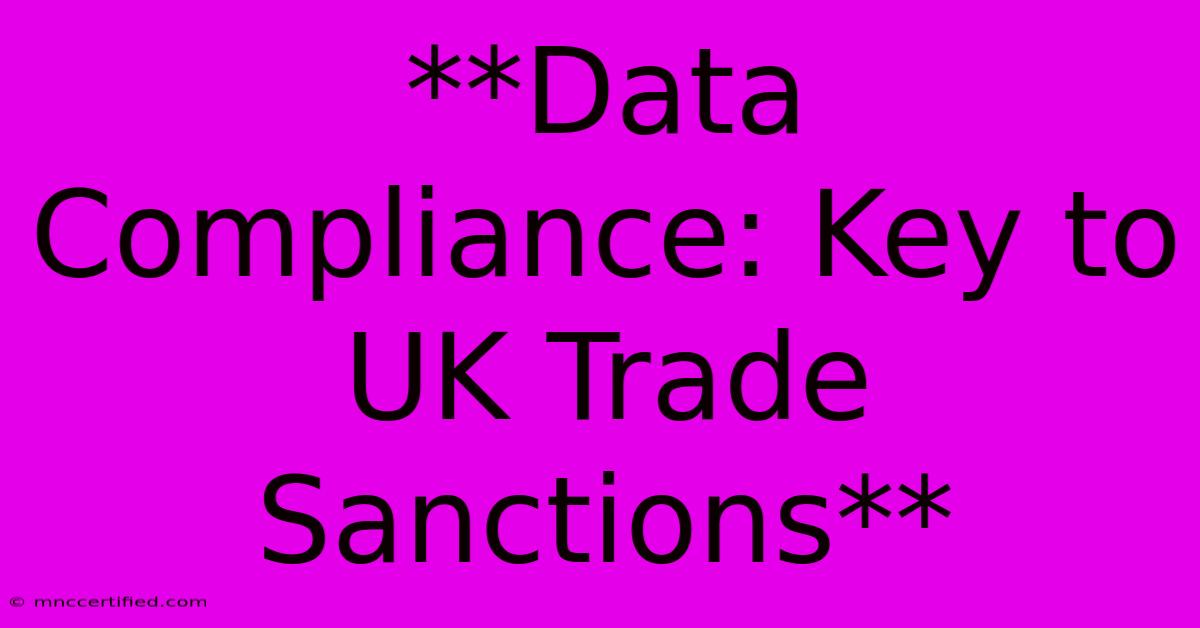**Data Compliance: Key To UK Trade Sanctions**

Table of Contents
Data Compliance: Key to UK Trade Sanctions
In today's interconnected world, businesses are increasingly navigating the complexities of international trade, particularly when it comes to complying with trade sanctions. The UK, like many other nations, imposes sanctions on individuals, entities, and countries for various reasons, including human rights violations, terrorism, and proliferation of weapons of mass destruction. Data compliance is crucial for businesses to ensure they are not unwittingly facilitating sanctioned activities and facing severe penalties.
Understanding UK Trade Sanctions
The UK's sanctions regime is governed by the Office of Financial Sanctions Implementation (OFSI), which enforces a comprehensive list of sanctions targets and regulations. Failing to comply with these regulations can result in significant fines, asset freezes, and even criminal prosecution.
To navigate this complex landscape effectively, businesses must:
- Identify and understand applicable sanctions: This includes staying updated on the latest designations and restrictions.
- Develop robust due diligence processes: Scrutinizing potential business partners and customers to ensure they are not on any sanctions lists.
- Maintain accurate and up-to-date records: This includes transaction records, customer information, and any other relevant data.
- Implement effective internal controls: Ensuring compliance with all relevant regulations and policies.
Data Compliance: The Core of Sanctions Compliance
Data compliance is central to ensuring compliance with UK trade sanctions. This involves collecting, storing, and using data in a way that:
- Accurately identifies sanctioned parties: This includes using reliable sanctions screening tools to verify potential business partners against sanctioned lists.
- Prevents accidental transactions: By having robust systems in place to automatically flag and block transactions with sanctioned entities.
- Provides evidence of compliance: Maintaining meticulous records of due diligence processes and transaction histories.
Data Security: An Essential Element
In addition to data compliance, data security is also paramount in the context of trade sanctions. Sensitive information related to customers, transactions, and due diligence processes must be protected from unauthorized access and cyber threats. This includes:
- Implementing strong access controls: Limiting access to sensitive data on a need-to-know basis.
- Using encryption: Protecting data both at rest and in transit.
- Regularly reviewing and updating security measures: Adapting to evolving cyber threats and regulatory requirements.
Building a Robust Data Compliance Framework
Businesses can build a robust data compliance framework by taking the following steps:
- Appoint a dedicated data compliance officer: Responsible for overseeing data management and ensuring compliance with regulations.
- Conduct regular data audits: To identify any gaps in compliance and implement corrective measures.
- Train employees on data compliance policies: Enhancing awareness and promoting responsible data handling practices.
- Develop clear procedures for managing data breaches: Responding swiftly and effectively to minimize potential harm.
Conclusion
Data compliance is not just a legal requirement, it's a strategic necessity for businesses operating in the global marketplace. By prioritizing data compliance and security, companies can mitigate the risks of sanctions violations, protect their reputation, and ensure long-term sustainability. Investing in a robust data compliance framework is crucial for navigating the complexities of international trade and ensuring responsible business practices in a world shaped by sanctions.
Keywords: UK trade sanctions, data compliance, Office of Financial Sanctions Implementation (OFSI), data security, sanctions screening, due diligence, data breaches, data management, sanctions regulations, compliance framework, international trade, global marketplace, data audit, employee training, responsible business practices.

Thank you for visiting our website wich cover about **Data Compliance: Key To UK Trade Sanctions**. We hope the information provided has been useful to you. Feel free to contact us if you have any questions or need further assistance. See you next time and dont miss to bookmark.
Featured Posts
-
M6 Closure Fatal Lorry Crash Details
Nov 07, 2024
-
Club Brugge 1 0 Aston Villa Ucl Loss
Nov 07, 2024
-
Donald Trump Inauguration Date And Details
Nov 07, 2024
-
Keir Starmer Defends Foreign Secretary On Trump Comments
Nov 07, 2024
-
Life Insurance For Heart Failure Patients
Nov 07, 2024